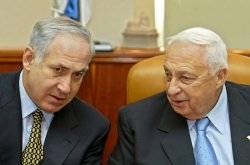Reactions from Israeli and Palestinian officials, as well as other world leaders, to the death of Ariel Sharon have been mixed.
The former Israeli prime minister and military commander died on Saturday at the age of 85 after being in a coma since 2006 when a stroke incapacitated him at the height of his political power.
"The State of Israel bows its head over the passing of former Prime Minister Ariel Sharon," current Israeli Prime Minister Benjamin Netanyahu said in a statement, expressing "deep sorrow" over the news.
"His memory will forever be held in the heart of the nation," Netanyahu said.
There was no immediate comment from Palestinian President Mahmoud Abbas, or the Palestinian Authority, on Sharon's passing.
But a senior Palestinian official from the Fatah party blamed Sharon for the death of former Palestinian leader Yasser Arafat.
"Sharon was a criminal, responsible for the assassination of Arafat, and we would have hoped to see him appear before the International Criminal Court as a war criminal," Jibril Rajub said.
Khalil al-Hayya, a leader of Hamas in the Gaza Strip, said: "We will remember Ariel Sharon as the man who killed, destroyed and caused the suffering for several Palestinian generations.
"After eight years, he is going the same direction as other tyrants and criminals whose hands were covered with Palestinian blood," al-Hayya added.
'Political courage'
United States President Barack Obama sent "deepest condolences" to Sharon's family and the Israeli people. "We join with the Israeli people in honoring his commitment to his country," Obama said.
French President Francois Hollande called Sharon "a major player in the history of his country".
"After [a] long military and political career he chose to move towards the dialogue with Palestine. I am offering my sincere condolences to his family and people of Israel," he said.
In the United Kingdom, Prime Minister David Cameron said: "Ariel Sharon is one of the most significant figures in Israeli history and as prime minister he took brave and controversial decisions in pursuit of peace, before he was so tragically incapacitated. Israel has today lost an important leader."
A United Nations spokesman said that Secretary-General Ban Ki-moon was "saddened" by Sharon's death.
"Prime Minister Sharon will be remembered for his political courage and determination to carry through with the painful and historic decision to withdraw Israeli settlers and troops from the Gaza Strip. His successor faces the difficult challenge of realizing the aspirations of peace between the Israeli and Palestinian people," a UN statement said.
Carl Bildt, Sweden's foreign minister, posted on Twitter: "Ariel Sharon was a great leader of Israel. A brilliant military commander, but also a wise statesman seeing the necessity of peace."
'Brave soldier'
Sharon was indirectly blamed for the 1982 massacre of Palestinian refugees in Lebanon's Sabra and Shatila refugee camps by Israel's Phalangist allies.
Al Jazeera's Zeina Khodr, reporting from the Sabra camp in Beirut on Saturday, said: "People here say... 'Ariel Sharon is now dead, but what he stood for is not dead. He was one Israeli official. The policy of the Israeli government has not changed.'
"People here really are very frustrated. They feel that justice was not served. But then again, Ariel Sharon's death is not going to change much," she said.
But Israeli politicians were quick to praise Sharon's legacy as military leader.
"Arik [Sharon] was a brave soldier and a daring leader who loved his nation and his nation loved him. He was one of Israel's great protectors and most important architects, who knew no fear and certainly never feared vision," President Shimon Peres said in a statement.
Tzipi Livni, Israel's justice minister and former member of Kadima, the party Sharon founded in 2005, also expressed "great sadness" over his death, saying he was "a brave fighter, commander, leader, [a] farmer whose legs were firmly planted in Israel's soil".
Speaking to Al Jazeera from Tel Aviv, Israeli journalist Akiva Eldar blamed Sharon for sabotaging Israeli-Palestinian peace negotiations.
"The legacy is that he left us with hundreds of thousands of [Israeli] people, and so many settlements [in the occupied West Bank] that are the greatest obstacle to peace," Eldar said.
"It was Ariel Sharon's vision to have one million Israelis in the West Bank, and make the Israeli withdrawal from the West Bank impossible. Even when he pulled out of Gaza, this was meant to undermine the resumption of the roadmap [to peace]."
PHOTO CAPTION
Prime Minister Benjamin Netanyahu, left, expressed 'deep sorrow' over Sharon's death [EPA]
Aljazeera


 Home
Home Discover Islam
Discover Islam Quran Recitations
Quran Recitations Lectures
Lectures
 Fatwa
Fatwa Articles
Articles Fiqh
Fiqh E-Books
E-Books Boys & Girls
Boys & Girls  Women
Women










